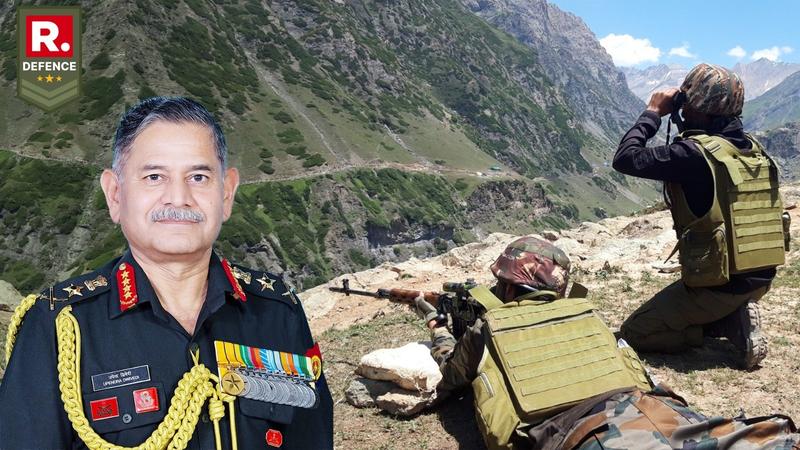Published 14:58 IST, January 13th 2025
80% of Terrorists Killed in J&K Are Pakistanis: Army Chief Exposes Islamabad’s Role in Exporting Terror
This alarming statistic underscores Pakistan’s continued involvement in cross-border terrorism.

New Delhi, India - In a damning revelation, Indian Army Chief General Upendra Dwivedi has disclosed that 80% of terrorists neutralized in Jammu and Kashmir are Pakistani nationals. This statistic underscores Pakistan 's continued role as the epicentre of terrorism, providing undeniable evidence of its state-sponsored export of violence into India.
While the global community advocates for peace and counter-terrorism, Pakistan's actions reflect a blatant disregard for international norms. The infiltration of foreign militants into Jammu and Kashmir, coupled with Islamabad's persistent failure to dismantle terror infrastructure, showcases its duplicitous approach: presenting a façade of diplomacy while actively nurturing and deploying militants across the border.
A Longstanding Pattern of Destabilization
Pakistan's involvement in fomenting unrest in Jammu and Kashmir is neither new nor subtle. For decades, it has harboured, trained, and financed terror groups like Lashkar-e-Taiba, Jaish-e-Mohammed, and Hizbul Mujahideen, using them as proxies to wage asymmetrical warfare against India. General Dwivedi's revelation further solidifies what the world already knows: Pakistan is a haven for terror masterminds, and its soil remains a breeding ground for anti-India activities.

Even as Pakistan grapples with its internal socio-economic crises, it prioritizes cross-border terrorism, diverting resources that could uplift its struggling population. This not only highlights its skewed priorities but also showcases its inability—or unwillingness—to recognize the disastrous impact of its policies.
Shifting the Narrative in Jammu and Kashmir
General Dwivedi also noted that 80% of active terrorists in Jammu and Kashmir hail from Pakistan. Yet, despite Islamabad's relentless efforts to destabilize the region, the Indian Army and security forces have achieved significant success in counter-insurgency operations. Jammu and Kashmir is gradually shifting from being a conflict zone to a tourist hub, a transformation that stands in stark contrast to Pakistan's agenda of perpetuating instability.

India’s developmental initiatives, improved governance, and enhanced security measures have fostered hope and progress in the region. Meanwhile, Pakistan continues to sow seeds of discord, desperately clinging to its outdated and destructive playbook.
The Northern Borders: Stability Amid Sensitivity
Discussing the situation along the Line of Actual Control (LAC), General Dwivedi described the situation as "sensitive but stable." He highlighted significant progress in resolving issues in the Depsang and Demchok regions of Eastern Ladakh.

"In October, the situation in Depsang and Demchok was resolved. Traditional patrolling and grazing have resumed in these areas. All my co-commanders are authorized to address these issues at the ground level to ensure they are resolved swiftly and effectively," Dwivedi explained.
He assured that India’s deployment along the LAC is robust and balanced, supported by advancements in war-fighting capabilities through the infusion of niche technologies.
Manipur : Tackling Violence and Enhancing Security
The Army Chief addressed the ongoing unrest in Manipur, acknowledging the cyclical nature of violence in the state.
"Incidents of violence in Manipur continue, but security forces are working tirelessly to bring peace. Enhanced surveillance and dominance along the Myanmar border have been established, and fencing is progressing to strengthen border security," he stated.

The Army Chief underscored the vital role of the Indian Army in nation-building and emphasized collaboration with the media to bolster national security.
"I firmly believe that mass media and security forces have immense potential to converge for nation-building. Our mission is to ensure full-spectrum preparedness while transforming the Indian Army into an Atmanirbhar, future-ready force that is a key pillar of the national security apparatus," he said.
Outlook and Future Steps
General Dwivedi’s address highlighted the Army’s proactive approach to tackling external and internal challenges. From counter-terrorism operations in Jammu and Kashmir to resolving border disputes with China and addressing insurgency in Manipur, the Indian Army continues to evolve as a technologically advanced and operationally robust force.
Key Takeaways:
- Jammu and Kashmir: 80% of terrorists killed and 80% of active terrorists are Pakistani nationals.
- Eastern Ladakh: Patrolling and grazing resumed in Depsang and Demchok, with localized conflict resolution mechanisms in place.
- Manipur: Security forces focused on curbing violence, enhancing surveillance, and securing the Myanmar border.
- Nation-Building: Emphasis on transforming the Army into a future-ready, self-reliant force aligned with the Atmanirbhar Bharat initiative.
Updated 15:01 IST, January 13th 2025




